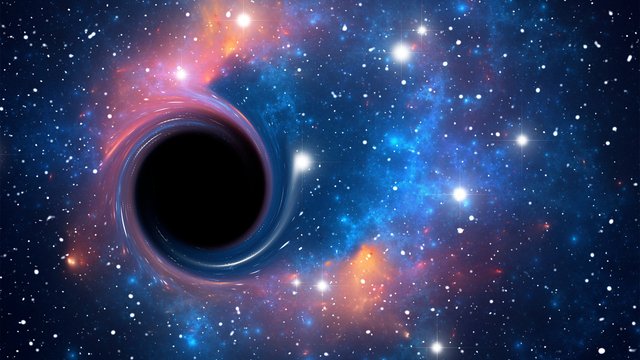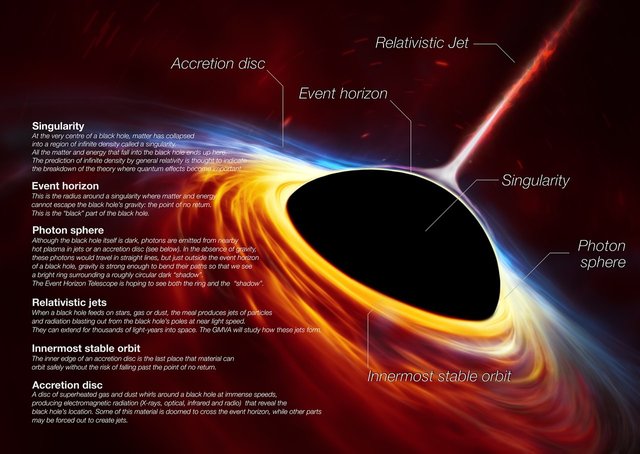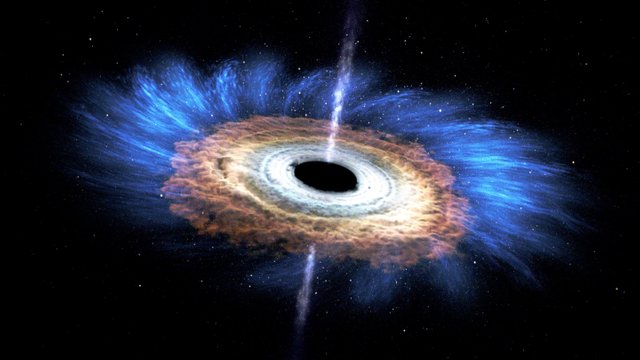A Few Things About Black Holes
I wrote about black holes a few times briefly in my last contributions and I'm sure you've heard and read about them yourself. Nevertheless you will not know much about this mysterious mood of nature. But that's quite normal, because we as humanity don't really know that much about this mystery. But what we know, you will read here in a small summary.
Strictly speaking, a black hole is not a hole at all, it is an object, but has no surface. But it bends the room so strongly due to its attraction that it creates a kind of funnel. Objects that get close to a black hole are simply pulled in and are stretched by gravity to such an extent that they are torn apart.
Without black holes, space might look quite different. Perhaps there would be no galaxies at all, or planets and stars would not exist as galaxy clusters at all. Black holes are available in different sizes and depending on their size and the way they were created, they are divided into different classes.
In 1967 by the theoretical physicist John Archibald Wheeler black holes are minted for the first time. The research of this mysterious phenomenon dates back to the 18th century. The British naturalist John Michelle described black holes as dark stars as early as 1783, which have such an attraction that not even the light could draw them away. But it was not until the twentieth century, with the development of the theory of relativity, that there was any real movement in the exploration of black holes.
A black hole occurs when matter collapses in a certain area of space. In this space there is so much mass that an inconceivable attraction is created. This matter used to be a huge star. If it explodes, the outer layers of the star are thrown away and the remaining residual matter can become a black hole. But that only happens with stars that are about twenty times as big as our sun. The remaining matter after the explosion is still much heavier than the sun, but is compressed in a relatively small space.
Black holes may also occur when two stars collide. But this can only happen if the mass of the stars is big enough. According to current theories, black holes may gradually disappear as they evaporate. The smaller the hole, the faster it will be gone.
We know that there are black holes because we can see and measure their effects. We can't see the holes themselves, but there is still some evidence that they exist. These include, for example, the so-called accretion disc. This is the area around the black holes where the matter is attracted by the hole but doesn't immediately fall into it. This creates friction. The accretion disc heats up and glows in bright colors. The radiation of the disc can then be measured with special devices.
In an online lecture published in 2014, the recently deceased physicist Stephen Hawking said that there are no black holes. At least not the way we imagine it to be. Because we actually assume that everything that gets into a black hole is lost forever. But according to quantum theory there is an escape from it. Hawking believed that black holes only hold the matter they suck in for a certain time and then throw it out again. But what is still missing is a physical theory to describe the whole thing plausibly. For this there would have to be an approach in which all four basic forces of attraction, electromagnetism and weak and strong interaction are combined. But physicists have been looking for this for a long time without success.
Black holes are invisible, but their enormous swallowing effect can be seen in their surroundings. They are not visible because they do not emit light. The attraction of the holes is so big that even light is swallowed. So we cannot see and observe the hole itself, but we can recognize it by the behavior of objects in its circle. So it can be, for example, that a star through the so called hole circles around the hole at an unusually higher speed, namely in the accretion disc already mentioned.
Black holes, in whose surroundings there is nothing that can be drawn in, sleep. Only then they become active until something gets sucked by them. We cannot see these holes at all in their inactive state.
Did you know that the center of the Milky Way, our galaxy, is a so-called black hole? That's why our galaxy spins and has vortex arms. Our solar system is in one of these vortex arms but the black hole in the center of our galaxy is not a threat to us humans, the earth and life for billions of years to come. All vortex galaxies in the universe have black holes in their centers. This is nothing unusual.
Research into black holes is also being carried out at the particle accelerator in Cern. There one hopes that we can come to new and steadfast insights and also tries to examine all the theories and theses, which were partly created for black holes. But until then these mysterious objects will remain a secret for us.
I'm aware that I maybe miss some things about black holes and if you have other informations, facts or something else about them, you are welcome to leave it in the comments.








Black holes are so complex!
What sound does a black hole make?
good question @cannabiscup, i dont know :)
Or maybe black holes are just space-time whirlpools that sometimes form in water or air. Or maybe it's tunnels that transfer energy to the other side of the universe. Just as stars emit energy from the other side of the universe, black holes take it from here and appear on the other side in the form of stars. Maybe the universe like a sheet of paper has 2 sides.
Perhaps... but perhaps to explore that would be awesome, wouldn't it?
I can not even imagine how to investigate. A suicide who flew into a black hole would probably find himself, but how to send him there and how to find out what happened to him.
did you watched the movie Interstellar ? Maybe like in this way how it is shown in the movie?
Black holes are stars that turn off other starlight. correct me if i wrong. Black Hole books
Человечество дальше своего спутника луны не летало,да и с луной вопрос спорный,а тут какое то явление на очень отдаленном расстоянии ,глядя в трубу высказать предположении что это,не зная и видя впервые,не иследовав это высказывать предположения очень глупо,так как в них нет истины.
Критика хороша и для того, чтобы подвергать сомнению вещи, но только в определенных рамках. Поэтому мы должны быть несколько оптимистичны.
Одно другому не мешает в разумных пределах оптимист ,Реалист эволюционирует , изучая сам набирая тем самым багаж знаний,
Кого проще обмануть тот кто иследовал сам,или тот кто верит безоговорочно радуясь тому чего нет,по своей психологии человек
проще поверит во что то,
это просто и не отнимает много времени
I can confirm that black holes exist, because that is where all my money went. 😆
The thing about black holes that will blow your mind is that as the gravity increases to almost infinity, so too does the warping of space time. With respect to observers of a black hole, time will slow for objects that approach a black hole. This means that gravity goes towards a seemingly infinite amount, then time itself slows to seemingly infinitely slow to a point where time doesn’t seem to exist.
In other words, by my perspective, I lost my money to a black hole long ago, but by my money’s perspective it has very recently been sucked into the black hole. 🙄
Interesting way of view :)))
@oendertuerk This is my favorite theme, thanks for writing about this topic.
It is really interesting, mysterious and magic!
In the center of our beautiful Galaxy the Milki Way we have the company of a supermassive black hole.
My dream is to travel from one Galaxy to another and explore other planets as for example Venus, Jupiter, and Neptune.
And, other modes of lives in the Universe.
Have a beautiful day @oendertuerk :)
with my pleasure @supernova55
Describing blackholes is very difficult. Because some scientific species may not be defining completely. Moreover there are many things that have not known or seen yet about the same issue. I think one of the longest studies in science history will contain blackholes.
Posted using Partiko Android
That's why scientists try to create small black holes in the particle accelerator of cern and study them. The insight that small black holes very quickly dissolve came from discoveries by cern.
black hole just light sucker and darkness spreader
Which is not good ...
But blog is very enlightened
I am very fond of these mysterious things
ty @dcryptography
How amazing that the forces that hold and keep the universe go round and maintain its balance is so huge and humble for man to grasp..